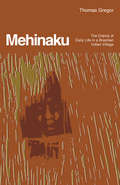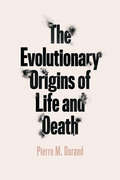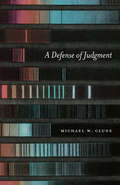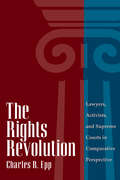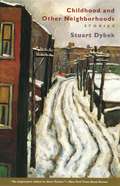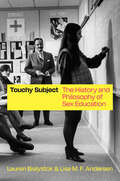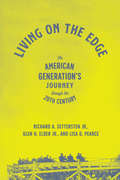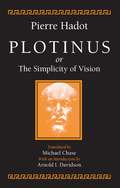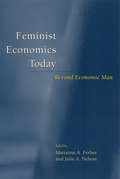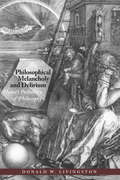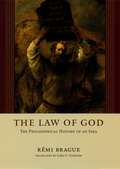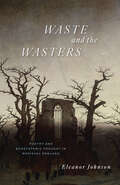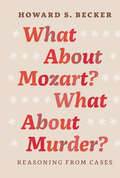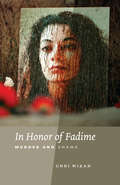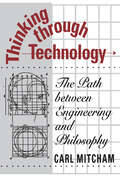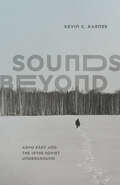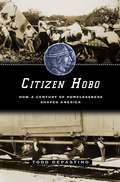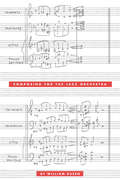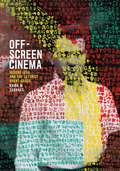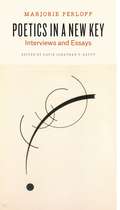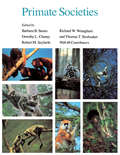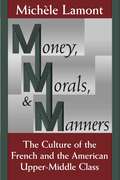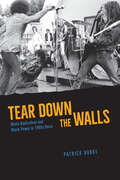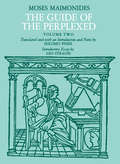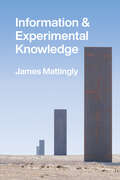- Table View
- List View
Mehinaku: The Drama of Daily Life in a Brazilian Indian Village
by Thomas GregorThomas Gregor sees the Mehinaku Indians of central Brazil as performers of roles, engaged in an ongoing improvisational drama of community life. The layout of the village and the architecture of the houses make the community a natural theater in the round, rendering the villagers' actions highly visible and audible. Lacking privacy, the Mehinaku have become masters of stagecraft and impression management, enthusiastically publicizing their good citizenship while ingeniously covering up such embarrassments as extramarital affairs and theft.
The Revolutionary Origins of Life and Death
by Pierre M. DurandThe question of why an individual would actively kill itself has long been an evolutionary mystery. Pierre M. Durand’s ambitious book answers this question through close inspection of life and death in the earliest cellular life. As Durand shows us, cell death is a fascinating lens through which to examine the interconnectedness, in evolutionary terms, of life and death. It is a truism to note that one does not exist without the other, but just how does this play out in evolutionary history? These two processes have been studied from philosophical, theoretical, experimental, and genomic angles, but no one has yet integrated the information from these various disciplines. In this work, Durand synthesizes cellular studies of life and death looking at the origin of life and the evolutionary significance of programmed cellular death. The exciting and unexpected outcome of Durand’s analysis is the realization that life and death exhibit features of coevolution. The evolution of more complex cellular life depended on the coadaptation between traits that promote life and those that promote death. In an ironic twist, it becomes clear that, in many circumstances, programmed cell death is essential for sustaining life.
A Defense of Judgment
by Michael W. CluneTeachers of literature make judgments about value. They tell their students which works are powerful, beautiful, surprising, strange, or insightful—and thus, which are more worthy of time and attention than others. Yet the field of literary studies has largely disavowed judgments of artistic value on the grounds that they are inevitably rooted in prejudice or entangled in problems of social status. For several decades now, professors have called their work value-neutral, simply a means for students to gain cultural, political, or historical knowledge. ?Michael W. Clune’s provocative book challenges these objections to judgment and offers a positive account of literary studies as an institution of aesthetic education. It is impossible, Clune argues, to separate judgments about literary value from the practices of interpretation and analysis that constitute any viable model of literary expertise. Clune envisions a progressive politics freed from the strictures of dogmatic equality and enlivened by education in aesthetic judgment, transcending consumer culture and market preferences. Drawing on psychological and philosophical theories of knowledge and perception, Clune advocates for the cultivation of what John Keats called “negative capability,” the capacity to place existing criteria in doubt and to discover new concepts and new values in artworks. Moving from theory to practice, Clune takes up works by Keats, Emily Dickinson, Gwendolyn Brooks, Samuel Beckett, and Thomas Bernhard, showing how close reading—the profession’s traditional key skill—harnesses judgment to open new modes of perception.
The Rights Revolution: Lawyers, Activists, and Supreme Courts in Comparative Perspective
by Charles R. EppIt is well known that the scope of individual rights has expanded dramatically in the United States over the last half-century. Less well known is that other countries have experienced "rights revolutions" as well. Charles R. Epp argues that, far from being the fruit of an activist judiciary, the ascendancy of civil rights and liberties has rested on the democratization of access to the courts—the influence of advocacy groups, the establishment of governmental enforcement agencies, the growth of financial and legal resources for ordinary citizens, and the strategic planning of grass roots organizations. In other words, the shift in the rights of individuals is best understood as a "bottom up," rather than a "top down," phenomenon.The Rights Revolution is the first comprehensive and comparative analysis of the growth of civil rights, examining the high courts of the United States, Britain, Canada, and India within their specific constitutional and cultural contexts. It brilliantly revises our understanding of the relationship between courts and social change.
Childhood and Other Neighborhoods: Stories
by Stuart DybekIn Stuart Dybek's Chicago, wonder lurks in unexpected places—in garbage-strewn alleys, gloomy basement apartments, abandoned rooms at the top of rickety stairs periodically rumbled by passing el trains. Transformed through the wide eyes of Dybek's adolescent heroes, these grimy urban backwaters become exotic landscapes of fear-filled possibility, of dreams not yet turned to nightmares. Chronicling what happens when Old World faith meets the dark side of the American dream, Dybek's poignant stories of coming of age in Chicago alternately appall, amaze, and just simply entertain.
Touchy Subject: The History and Philosophy of Sex Education (History And Philosophy Of Education Ser.)
by Lauren Bialystok Lisa M.F. AndersenA case for sex education that puts it in historical and philosophical context. In the United States, sex education is more than just an uncomfortable rite of passage: it's a political hobby horse that is increasingly out of touch with young people’s needs. In Touchy Subject, philosopher Lauren Bialystok and historian Lisa M. F. Andersen unpack debates over sex education, explaining why it’s worth fighting for, what points of consensus we can build upon, and what sort of sex education schools should pursue in the future. Andersen surveys the history of school-based sex education in the United States, describing the key question driving reform in each era. In turn, Bialystok analyzes the controversies over sex education to make sense of the arguments and offer advice about how to make educational choices today. Together, Bialystok and Andersen argue for a novel framework, Democratic Humanistic Sexuality Education, which exceeds the current conception of “comprehensive sex education” while making room for contextual variation. More than giving an honest run-down of the birds and the bees, sex education should respond to the features of young people’s evolving worlds, especially the digital world, and the inequities that put some students at much higher risk of sexual harm than others. Throughout the book, the authors show how sex education has progressed and how the very concept of “progress” remains contestable.
Living on the Edge: An American Generation’s Journey through the 20th Century
by Richard A. Settersten Jr. Glen H. Elder Lisa D. PearceHistory carves its imprint on human lives for generations after. When we think of the radical changes that transformed America during the twentieth century, our minds most often snap to the fifties and sixties: the Civil Rights Movement, changing gender roles, and new economic opportunities all point to a decisive turning point. But these were not the only changes that shaped our world, and in Living on the Edge, we learn that rapid social change and uncertainty also defined the lives of Americans born at the turn of the twentieth century. The changes they cultivated and witnessed affect our world as we understand it today. Drawing from the iconic longitudinal Berkeley Guidance Study, Living on the Edge reveals the hopes, struggles, and daily lives of the 1900 generation. Most surprising is how relevant and relatable the lives and experiences of this generation are today, despite the gap of a century. From the reorganization of marriage and family roles and relationships to strategies for adapting to a dramatically changing economy, the challenges faced by this earlier generation echo our own time. Living on the Edge offers an intimate glimpse into not just the history of our country, but the feelings, dreams, and fears of a generation remarkably kindred to the present day.
Plotinus or the Simplicity of Vision
by Pierre HadotSince its original publication in France in 1963, Pierre Hadot's lively philosophical portrait of Plotinus remains the preeminent introduction to the man and his thought. Michael Chase's lucid translation—complete with a useful chronology and analytical bibliography—at last makes this book available to the English-speaking world. Hadot carefully examines Plotinus's views on the self, existence, love, virtue, gentleness, and solitude. He shows that Plotinus, like other philosophers of his day, believed that Plato and Aristotle had already articulated the essential truths; for him, the purpose of practicing philosophy was not to profess new truths but to engage in spiritual exercises so as to live philosophically. Seen in this light, Plotinus's counsel against fixation on the body and all earthly matters stemmed not from disgust or fear, but rather from his awareness of the negative effect that bodily preoccupation and material concern could have on spiritual exercises.
Feminist Economics Today: Beyond Economic Man
by Marianne A. Ferber and Julie A. NelsonThe 1993 publication of Marianne A. Ferber and Julie A. Nelson's Beyond Economic Man was a landmark in both feminist scholarship and the discipline of economics, and it quickly became a handbook for those seeking to explore the emerging connections between the two. A decade later, this book looks back at the progress of feminist economics and forward to its future, offering both a thorough overview of feminist economic thought and a collection of new, high-quality work from the field's leading scholars.
Philosophical Melancholy and Delirium: Hume's Pathology of Philosophy
by Donald W. LivingstonThe Scottish philosopher David Hume is commonly understood as the original proponent of the "end of philosophy." In this powerful new study, Donald Livingston completely revises our understanding of Hume's thought through his investigation of Hume's distinction between "true" and "false" philosophy. For Hume, false philosophy leads either to melancholy over the groundlessness of common opinion or delirium over transcending it, while true philosophy leads to wisdom. Livingston traces this distinction through all of Hume's writings, providing a systematic pathology of the corrupt philosophical consciousness in history, politics, philosophy, and literature that characterized Hume's own time as well as ours. By demonstrating how a philosophical method can be used to expose the political motivations behind intellectual positions, historical events, and their subsequent interpretations, Livingston revitalizes Hume's thought and reveals its relevance for contemporary dicussions of politics, nationalism, and ideology for the first time.
The Law of God: The Philosophical History of an Idea
by Rémi BragueThe law of God: these words conjure an image of Moses breaking the tablets at Mount Sinai, but the history of the alliance between law and divinity is so much longer, and its scope so much broader, than a single Judeo-Christian scene can possibly suggest. In his stunningly ambitious new history, Rémi Brague goes back three thousand years to trace this idea of divine law in the West from prehistoric religions to modern times—giving new depth to today’s discussions about the role of God in worldly affairs. Brague masterfully describes the differing conceptions of divine law in Judaic, Islamic, and Christian traditions and illuminates these ideas with a wide range of philosophical, political, and religious sources. In conclusion, he addresses the recent break in the alliance between law and divinity—when modern societies, far from connecting the two, started to think of law simply as the rule human community gives itself. Exploring what this disconnection means for the contemporary world, Brague—powerfully expanding on the project he began with The Wisdom of the World—re-engages readers in a millennia-long intellectual tradition, ultimately arriving at a better comprehension of our own modernity. “Brague’s sense of intellectual adventure is what makes his work genuinely exciting to read. The Law of God offers a challenge that anyone concerned with today’s religious struggles ought to take up.”—Adam Kirsch, New YorkSun “Scholars and students of contemporary world events, to the extent that these may be viewed as a clash of rival fundamentalisms, will have much to gain from Brague’s study. Ideally, in that case, the book seems to be both an obvious primer and launching pad for further scholarship.”—Times Higher Education Supplement
Waste and the Wasters: Poetry and Ecosystemic Thought in Medieval England
by Eleanor JohnsonA groundbreaking examination of ecological thought in medieval England. While the scale of today’s crisis is unprecedented, environmental catastrophe is nothing new. Waste and the Wasters studies the late Middle Ages, when a convergence of land contraction, soil depletion, climate change, pollution, and plague subsumed Western Europe. In a culture lacking formal scientific methods, the task of explaining and coming to grips with what was happening fell to medieval poets. The poems they wrote used the terms “waste” or “wasters” to anchor trenchant critiques of people’s unsustainable relationships with the world around them and with each other. In this book, Eleanor Johnson shows how poetry helped medieval people understand and navigate the ecosystemic crises—both material and spiritual—of their time.
What About Mozart? What About Murder?: Reasoning From Cases
by Howard S. BeckerIn 1963, Howard S. Becker gave a lecture about deviance, challenging the then-conventional definition that deviance was inherently criminal and abnormal and arguing that instead, deviance was better understood as a function of labeling. At the end of his lecture, a distinguished colleague standing at the back of the room, puffing a cigar, looked at Becker quizzically and asked, “What about murder? Isn’t that really deviant?” It sounded like Becker had been backed into a corner. Becker, however, wasn’t defeated! Reasonable people, he countered, differ over whether certain killings are murder or justified homicide, and these differences vary depending on what kinds of people did the killing. In What About Mozart? What About Murder?, Becker uses this example, along with many others, to demonstrate the different ways to study society, one that uses carefully investigated, specific cases and another that relies on speculation and on what he calls “killer questions,” aimed at taking down an opponent by citing invented cases. Becker draws on a lifetime of sociological research and wisdom to show, in helpful detail, how to use a variety of kinds of cases to build sociological knowledge. With his trademark conversational flair and informal, personal perspective Becker provides a guide that researchers can use to produce general sociological knowledge through case studies. He champions research that has enough data to go beyond guesswork and urges researchers to avoid what he calls “skeleton cases,” which use fictional stories that pose as scientific evidence. Using his long career as a backdrop, Becker delivers a winning book that will surely change the way scholars in many fields approach their research.
In Honor of Fadime: Murder and Shame
by Unni WikanIn 2002 young Fadime Sahindal was brutally murdered by her own father. She belonged to a family of Kurdish immigrants who had lived in Sweden for almost two decades. But Fadime’s relationship with a man outside of their community had deeply dishonored her family, and only her death could remove the stain. This abhorrent crime shocked the world, and her name soon became a rallying cry in the struggle to combat so-called honor killings. Unni Wikan narrates Fadime’s heartbreaking story through her own eloquent words, along with the testimonies of her father, mother, and two sisters. What unfolds is a tale of courage and betrayal, loyalty and love, power and humiliation, and a nearly unfathomable clash of cultures. Despite enduring years of threats over her emancipated life, Fadime advocated compassion for her killer to the end, believing him to be trapped by an unyielding code of honor. Wikan puts this shocking event in context by analyzing similar honor killings throughout Europe, Canada, and the United States. She also examines the concept of honor in historical and cross-cultural depth, concluding that Islam itself is not to blame—indeed, honor killings occur across religious and ethnic traditions—but rather the way that many cultures have resolutely linked honor with violence. In Honor of Fadime holds profound and timely insights into conservative Kurdish culture, but ultimately the heart of this powerful book is Fadime’s courageous and tragic story—and Wikan’s telling of it is riveting.
Thinking through Technology: The Path between Engineering and Philosophy
by Carl MitchamWhat does it mean to think about technology philosophically? Why try? These are the issues that Carl Mitcham addresses in this work, a comprehensive, critical introduction to the philosophy of technology and a discussion of its sources and uses. Tracing the changing meaning of "technology" from ancient times to our own, Mitcham identifies the most important traditions of critical analysis of technology: the engineering approach, which assumes the centrality of technology in human life; and the humanities approach, which is concerned with its moral and cultural boundaries. Mitcham bridges these two traditions through an analysis of discussions of engineering design, of the distinction between tools and machines, and of engineering science itself. He looks at technology as it is experienced in everyday life—as material objects (from kitchenware to computers), as knowledge ( including recipes, rules, theories, and intuitive "know-how"), as activity (design, construction, and use), and as volition (knowing how to use technology and understanding its consequences). By elucidating these multiple aspects, Mitcham establishes criteria for a more comprehensive analysis of ethical issues in applications of science and technology. This book will guide anyone wanting to reflect on technology and its moral implications.
Sounds Beyond: Arvo Pärt and the 1970s Soviet Underground
by Kevin C. KarnesSounds Beyond charts the origins of Arvo Pärt’s most famous music, which was created in dialogue with underground creative circles in the USSR. In Sounds Beyond, Kevin C. Karnes studies the interconnected alternative music and art scenes in the USSR during the second half of the 1970s, revealing the audacious origins of some of Estonian composer Arvo Pärt’s most famous music. Karnes shows how Pärt’s work was created within a vital yet forgotten culture of collective experimentation, the Soviet underground. Mining archives and oral history from across the former USSR, Sounds Beyond carefully situates modes of creative experimentation within their late socialist contexts. In documenting Pärt’s work, Karnes reveals the rich creative culture that thrived covertly in the USSR and the network of figures that made underground performances possible: students, audio engineers, sympathetic administrators, star performers, and aspiring DJs. Sounds Beyond advances a new understanding of Pärt’s music as an expression of the aesthetic and religious commitments shared, nurtured, and celebrated by many in Soviet underground circles. At the same time, this story attests to the lasting power of Pärt’s music. Dislodging the mythology of the solitary creative genius, Karnes shows that Pärt’s work would be impossible without community.
Citizen Hobo: How a Century of Homelessness Shaped America
by Todd DePastinoIn the years following the Civil War, a veritable army of homeless men swept across America's "wageworkers' frontier" and forged a beguiling and bedeviling counterculture known as "hobohemia." Celebrating unfettered masculinity and jealously guarding the American road as the preserve of white manhood, hoboes took command of downtown districts and swaggered onto center stage of the new urban culture. Less obviously, perhaps, they also staked their own claims on the American polity, claims that would in fact transform the very entitlements of American citizenship. In this eye-opening work of American history, Todd DePastino tells the epic story of hobohemia's rise and fall, and crafts a stunning new interpretation of the "American century" in the process. Drawing on sources ranging from diaries, letters, and police reports to movies and memoirs, Citizen Hobo breathes life into the largely forgotten world of the road, but it also, crucially, shows how the hobo army so haunted the American body politic that it prompted the creation of an entirely new social order and political economy. DePastino shows how hoboes—with their reputation as dangers to civilization, sexual savages, and professional idlers—became a cultural and political force, influencing the creation of welfare state measures, the promotion of mass consumption, and the suburbanization of America. Citizen Hobo's sweeping retelling of American nationhood in light of enduring struggles over "home" does more than chart the change from "homelessness" to "houselessness." In its breadth and scope, the book offers nothing less than an essential new context for thinking about Americans' struggles against inequality and alienation.
Composing for the Jazz Orchestra
by William Russo"Although it will be of primary interest to those who are engaged in composition themselves, [this] book is also recommended for readers who may wish to gain further insight into just what makes jazz composition so different from traditional approaches."—Malcolm Bessom, The Music Magazine
Off-Screen Cinema: Isidore Isou and the Lettrist Avant-Garde
by Kaira M. CabañasOne of the most important avant-garde movements of postwar Paris was Lettrism, which crucially built an interest in the relationship between writing and image into projects in poetry, painting, and especially cinema. Highly influential, the Lettrists served as a bridge of sorts between the earlier works of the Dadaists and Surrealists and the later Conceptual artists.Off-Screen Cinema is the first monograph in English of the Lettrists. Offering a full portrait of the avant-garde scene of 1950s Paris, it focuses on the film works of key Lettrist figures like Gil J Wolman, Maurice Lemaître, François Dufrêne, and especially the movement's founder, Isidore Isou, a Romanian immigrant whose “discrepant editing” deliberately uncoupled image and sound. Through Cabañas's history, we see not only the full scope of the Lettrist project, but also its clear influence on Situationism, the French New Wave, the New Realists, as well as American filmmakers such as Stan Brakhage.
Poetics in a New Key: Interviews and Essays
by Marjorie PerloffMarjorie Perloff writes in her preface to Poetics in a New Key that when she learned David Jonathan Y. Bayot wanted to publish a collection of her interviews and essays, she was “at once honored and mystified.” But to Perloff’s surprise and her readers’ delight, the resulting assembly not only presents an accessible and provocative introduction to Perloff’s critical thought, but also highlights the wide range of her interests, and the energetic reassessments and new takes that have marked her academic career. The fourteen interviews in Poetics in a New Key—conducted by scholars, poets, and critics from the United States, Denmark, Norway, France, and Poland, including Charles Bernstein, Hélène Aji, and Peter Nicholls—cover a broad spectrum of topics in the study of poetry: its nature as a literary genre, its current state, and its relationship to art, politics, language, theory, and technology. Also featured in the collection are three pieces by Perloff herself: an academic memoir, an exploration of poetry pedagogy, and an essay on twenty-first-century intellectuals. But across all the interviews and essays, Perloff’s distinctive personality and approach to reading and talking resound, making this new collection an inspiring resource for scholars both of poetry and writing.
Primate Societies: With 46 Contributors
by Barbara B. Smuts, Dorothy L. Cheney, Robert M. Seyfarth, Richard W. Wrangham and Thomas T. StruhsakerPrimate Societies is a synthesis of the most current information on primate socioecology and its theoretical and empirical significance, spanning the disciplines of behavioral biology, ecology, anthropology, and psychology. It is a very rich source of ideas about other taxa. "A superb synthesis of knowledge about the social lives of non-human primates."—Alan Dixson, Nature
Money, Morals, & Manners: The Culture of the French and the American Upper-Middle Class (Morality And Society Ser.)
by Michèle LamontDrawing on remarkably frank, in-depth interviews with 160 successful men in the United States and France, Michèle Lamont provides a rare and revealing collective portrait of the upper-middle class—the managers, professionals, entrepreneurs, and experts at the center of power in society. Her book is a subtle, textured description of how these men define the values and attitudes they consider essential in separating themselves—and their class—from everyone else.Money, Morals, and Manners is an ambitious and sophisticated attempt to illuminate the nature of social class in modern society. For all those who downplay the importance of unequal social groups, it will be a revelation. "A powerful, cogent study that will provide an elevated basis for debates in the sociology of culture for years to come."—David Gartman, American Journal of Sociology "A major accomplishment! Combining cultural analysis and comparative approach with a splendid literary style, this book significantly broadens the understanding of stratification and inequality. . . . This book will provoke debate, inspire research, and serve as a model for many years to come."—R. Granfield, Choice "This is an exceptionally fine piece of work, a splendid example of the sociologist's craft."—Lewis Coser, Boston College
Tear Down the Walls: White Radicalism and Black Power in 1960s Rock
by Patrick BurkeFrom the earliest days of rock and roll, white artists regularly achieved fame, wealth, and success that eluded the Black artists whose work had preceded and inspired them. This dynamic continued into the 1960s, even as the music and its fans grew to be more engaged with political issues regarding race. In Tear Down the Walls, Patrick Burke tells the story of white American and British rock musicians’ engagement with Black Power politics and African American music during the volatile years of 1968 and 1969. The book sheds new light on a significant but overlooked facet of 1960s rock—white musicians and audiences casting themselves as political revolutionaries by enacting a romanticized vision of African American identity. These artists’ attempts to cast themselves as revolutionary were often naïve, misguided, or arrogant, but they could also reflect genuine interest in African American music and culture and sincere investment in anti-racist politics. White musicians such as those in popular rock groups Jefferson Airplane, the Rolling Stones, and the MC5, fascinated with Black performance and rhetoric, simultaneously perpetuated a long history of racial appropriation and misrepresentation and made thoughtful, self-aware attempts to respectfully present African American music in forms that white leftists found politically relevant. In Tear Down the Walls Patrick Burke neither condemns white rock musicians as inauthentic nor elevates them as revolutionary. The result is a fresh look at 1960s rock that provides new insight into how popular music both reflects and informs our ideas about race and how white musicians and activists can engage meaningfully with Black political movements.
The Guide of the Perplexed, Volume 2
by Moses MaimonidesThis monument of rabbinical exegesis written at the end of the twelfth century has exerted an immense and continuing influence upon Jewish thought. Its aim is to liberate people from the tormenting perplexities arising from their understanding of the Bible according only to its literal meaning. This edition contains extensive introductions by Shlomo Pines and Leo Strauss, a leading authority on Maimonides.
Information & Experimental Knowledge
by James MattinglyAn ambitious new model of experimentation that will reorient our understanding of the key features of experimental practice. What is experimental knowledge, and how do we get it? While there is general agreement that experiment is a crucial source of scientific knowledge, how experiment generates that knowledge is far more contentious. In this book, philosopher of science James Mattingly explains how experiments function. Specifically, he discusses what it is about experimental practice that transforms observations of what may be very localized, particular, isolated systems into what may be global, general, integrated empirical knowledge. Mattingly argues that the purpose of experimentation is the same as the purpose of any other knowledge-generating enterprise—to change the state of information of the knower. This trivial-seeming point has a non-trivial consequence: to understand a knowledge-generating enterprise, we should follow the flow of information. Therefore, the account of experimental knowledge Mattingly provides is based on understanding how information flows in experiments: what facilitates that flow, what hinders it, and what characteristics allow it to flow from system to system, into the heads of researchers, and finally into our store of scientific knowledge.
